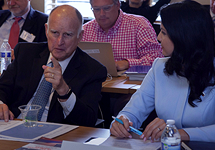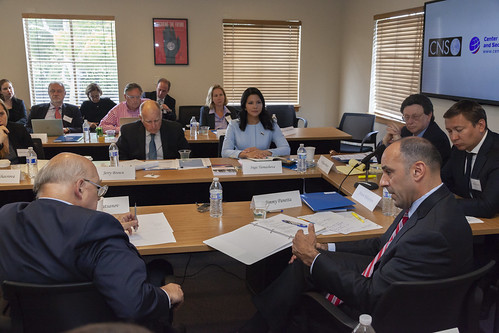August 6, 2018
 US–Russia relations are, by many accounts, in worse shape today than they were at the height of the Cold War. One would not have known this, however, from the constructive and collegial atmosphere at a workshop for American and Russian experts and policy makers that the James Martin Center for Nonproliferation Studies (CNS) hosted last week. The two-day event, which CNS co-organized with Moscow’s Center for Energy and Security Studies (CENESS), took place on July 30 and 31 in Monterey. Its participants included prominent experts and many young researchers, as well as former US Secretary of State William Perry, former Soviet and Russian Ambassador Sergey Batsanov, Congressman Jimmy Panetta, and Inga Yumasheva, a member of the Russian Duma. Governor Jerry Brown also was an active participant throughout the workshop and delivered the keynote after-dinner speech on July 31. The objective of the workshop was to facilitate in-depth discussion on a host of topics relating to nuclear nonproliferation and disarmament between representatives from both countries. Everyone in attendance, whether Russian or American, was quick to oblige.
US–Russia relations are, by many accounts, in worse shape today than they were at the height of the Cold War. One would not have known this, however, from the constructive and collegial atmosphere at a workshop for American and Russian experts and policy makers that the James Martin Center for Nonproliferation Studies (CNS) hosted last week. The two-day event, which CNS co-organized with Moscow’s Center for Energy and Security Studies (CENESS), took place on July 30 and 31 in Monterey. Its participants included prominent experts and many young researchers, as well as former US Secretary of State William Perry, former Soviet and Russian Ambassador Sergey Batsanov, Congressman Jimmy Panetta, and Inga Yumasheva, a member of the Russian Duma. Governor Jerry Brown also was an active participant throughout the workshop and delivered the keynote after-dinner speech on July 31. The objective of the workshop was to facilitate in-depth discussion on a host of topics relating to nuclear nonproliferation and disarmament between representatives from both countries. Everyone in attendance, whether Russian or American, was quick to oblige.
Over two days, the group of experts addressed issues ranging from the future of nuclear arms control to the impact of the 2017 Treaty on the Prohibition of Nuclear Weapons—the “ban treaty”—on the Treaty on the Non-proliferation of Nuclear Weapons—the NPT, which was concluded 50 years ago. They also examined how perennial challenges, such as ensuring that ostensibly peaceful technologies are not used to make weapons of mass destruction, have become more complicated with the introduction of disruptive technologies like 3D printing. In each session, US and Russian experts first delivered formal presentations before the floor was opened for questions and comments. Without exception, these exchanges of view were lively, wide-ranging, and thoughtful. They also reflected the diverse professional expertise of the participants.
One issue where all parties appeared to agree related to the need to resume dialogue on nuclear issues between Russian and American officials at a high level. At a public lunchtime talk, Secretary Perry drove home both the degree of disengagement between the two nuclear powers today and its potential consequences. As Perry observed, “even during the depth of the Cold War, we did not lack the dialogue we lack today.” In his view, this state of affairs could lead to a nuclear war, either as a result of a miscalculation or accident. Perry reminded his audience that the Soviet Union and the United States had nearly stumbled into nuclear war several times in the past, and that only the trust and confidence established between the two countries’ leaders prevented them from making rash—and devastating—decisions on the basis of miscommunication.
Illustrative of the difficulties of re-establishing dialogue was the absence at the workshop of any currently-serving US or Russian official with direct responsibility for national nuclear policy. Nevertheless, the meeting—and other events of its kind—represent an important step toward re-establishing regular interactions between American and Russian experts on nuclear issues. The participants’ interventions suggested that there are, in fact, significant areas where Moscow’s and Washington’s interests still converge in this domain. Significant, too, was that the lines of debate rarely seemed to coalesce around a distinctly “Russian” or “American” position. While it was clear that the participants held a range of sometimes-divergent views, a former Russian diplomat and a young American researcher were as likely to see eye-to-eye on a particular issue as two experts from the same country. A willingness on the part of participants from both Russia and the United States to move beyond the official national perspectives of their governments helped to facilitate this genuine exchange of views. The outcome was a dialogue that paved the way for a better understanding of where cooperation on nonproliferation and arms control could be possible today. It is heartening to know that there is still support for the joint efforts on these issues among top-level experts and lawmakers in both countries, even during a time of significant change.
CNS Director William Potter directed special praise to the young Russian and American experts at the meeting, who spoke with great poise and eloquence. “They have the potential,” he observed, “to replenish the depleted ranks of nonproliferation specialists in both countries and restore US–Russian cooperation in this critical domain.”
Slideshow from the Workshop
Move your mouse on top of the image to see the next slide.

